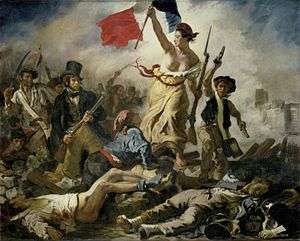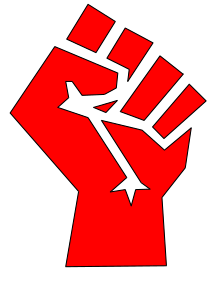Social revolution
Social revolutions are sudden changes in the structure and nature of society.[1] These revolutions are usually recognized as having transformed in society, culture, philosophy, and technology much more than political systems.[2]
Theda Skocpol in her article "France, Russia, China: A Structural Analysis of Social Revolutions" states that social revolution is a "combination of thoroughgoing structural transformation and massive class upheavals".[3] She comes to this definition by combining Samuel P. Huntington's definition that it "is a rapid, fundamental, and violent domestic change in the dominant values and myths of society, in its political institutions, social structure, leadership, and government activities and policies"[4] and Vladimir Lenin's, which is that revolutions are "the festivals of the oppressed...[who act] as creators of a new social order".[5] She also states that this definition excludes many revolutions, because they fail to meet either or both of the two parts of this definition.[6]
See also
- Rojava Revolution
- Rwandan Revolution, also called the "Social Revolution"
- Social Revolution festival
- Sociology of Revolution
References
- ↑ "social revolution". oxforddictionaries.com. Oxford University Press. Retrieved 24 August 2017.
- ↑ Irving E. Fang, A History of Mass Communication: Six Information Revolutions, Focal Press, 1997, ISBN 0-240-80254-3, p. xv
- ↑ Skocpol, Theda. 1979. States and Social Revolutions: A Comparative Analysis of France, Russia and China. Cambridge: Cambridge University Press., p. 173
- ↑ Huntington, Samuel P. 1968. Political Order in Changing Societies. New Haven: Yale University Press., p.264
- ↑ (Skopcol, op cit)
- ↑ Skocpol, Theda. 1979. States and Social Revolutions: A Comparative Analysis of France, Russia and China. Cambridge: Cambridge University Press., p.3.
Further reading
- J.7 What do anarchists mean by social revolution? from An Anarchist FAQ, Volume 2 (2012)

